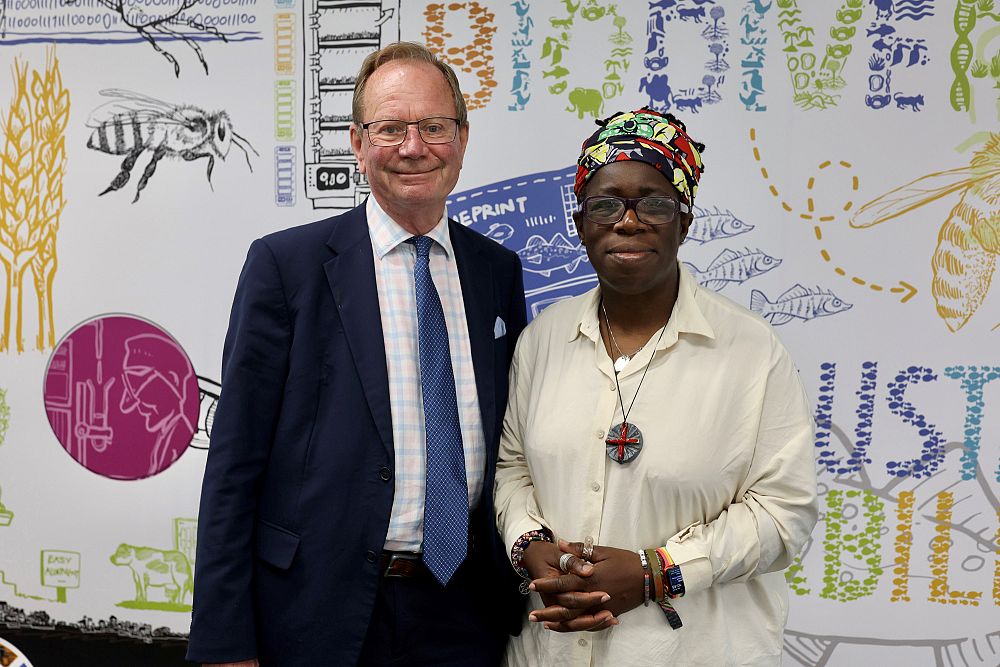Rosamund’s nine-year-old daughter Ella Roberta died in 2013 due to illegal levels of air pollution near their home.
Rosamund’s nine-year-old daughter Ella Roberta died in 2013 due to illegal levels of air pollution near their home.
“Air pollution is a silent killer and a pandemic,” she told delegates, “killing more people than Covid. On the days there is a spike in pollution, more people go to hospital. If we clean up the air it wouldn’t be such a burden on the NHS. My daughter died a horrible death and children continue to die from asthma. It is our right to breathe clean air and we will keep battling to be heard.”
Air pollution is linked to up to 43,000 deaths a year in the UK and is the largest environmental impact to our health with children, the elderly and clinically vulnerable, most impacted.
There is strong evidence to show air pollution accelerates the progression of coronary heart disease, stroke, respiratory diseases, dementia and lung cancer. Evidence also shows that it contributes to the start of asthma, makes it worse over time and can also contribute to early death.
Christine McGrath, Wessex Health Partners Managing Director said: “We know polluted air, indoor and outdoor, is a major threat to health in the south and exacerbates health inequalities. This includes communities in areas of higher pollution, such as those living close to busy roads, children, the elderly and those with long term health conditions.
“With the right research in place, and by linking people together, we can support policymakers to enact bold policies which drive change and protect our most vulnerable residents.”
Ella’s death was attributed to illegal levels of air pollution near their home. The family lived just 30 metres from London’s South Circular Road, one of the most polluted roads in Europe. In the years since, Rosamund has become one of the most powerful voices in the air pollution debate.
Rosamund spent the morning with Clean Air South delegates at the University of Southampton’s (UoS) Future Towns Innovation Hub in Chilworth, before visiting University Hospital Southampton to speak to medical students, nurses and consultants, and hear first-hand about the education underway to ensure there is greater awareness of the impact of air pollution in relation to patients in their care.
As well as meeting Diana Eccles, Dean of the Faculty of Medicine at UoS, Rosamund will also visit the NIHR Clinical Research Facility, where trials are underway to improve treatments for children with asthma and other conditions.
Dr Thom Daniels, consultant respiratory physician at University Hospital Southampton (UHS), said: “Poor air quality is one of the major public health challenges of our time, contributing to the shortened lives, poor health and deaths of thousands of people in the UK. We are delighted to welcome Rosamund to our hospital, giving her the chance to hear and see some of the work we are doing around this vitally important issue, including leading the way with clinical research that aims to provide better treatment and outcomes for our patients.”
Rosamund’s visit was been arranged by Sir Stephen Holgate, Professor of Immunopharmacology at the University of Southampton and internationally leading clean air expert. Rosamund and Stephen have worked closely for many years, and Stephen played a key role in the second inquest into Ella’s death.
Prof Holgate said: “Rosamund has become one of the world’s most successful campaigners on clean air, and we are very keen to hear her personal story which is such a powerful reminder about the human toll of air pollution. We really want to use this chance to accelerate work to improve air quality in the south with its unique air pollution issues.”
Clean Air South is overseeing a landmark report into the state of air quality in the Wessex area. The report is sponsored as part of the University of Southampton’s civic impact activities and a key activity under the University of Southampton’s role as a Civic University.
Report authors, Professor John Boswell, co-director of Centre for South, and Adam Meylan–Stevenson, from the University of Southampton, outlined initial findings, important gaps in the evidence, and opportunities for policy makers in the region to improve the air we all breathe.
Overall, Clean Air South aims to improve air quality by connecting health researchers with policy makers. Jointly led by Wessex Health Partners and the Sustainability and Resilience Institute (SRI), part of the University of Southampton, the partnership brings together expertise in research, innovation and education.
It aims to:
- Identify gaps in research and promote deeper understanding of air quality and its impact in the central south region
* Better understand local population health needs in relation to air quality
* Develop and implement innovations and policy change
* Develop education and training for both the general population and healthcare professionals to prevent, manage and treat ill health associated with poor air quality
* Help reduce the percentage of the local population with co-morbidities associated with polluted air for future generations
- Identify gaps in research and promote deeper understanding of air quality and its impact in the central south region
- Better understand local population health needs in relation to air quality
- Develop and implement innovations and policy change
- Develop education and training for both the general population and healthcare professionals to prevent, manage and treat ill health associated with poor air quality
- Help reduce the percentage of the local population with co-morbidities associated with polluted air for future generations
Prof Craig Hutton, Professor of Sustainability Science & Director of the Sustainability & Resilience Institute (SRI), added: “The University of Southampton has a strong applied research interest in clean air, particularly in terms of understanding how the most vulnerable in society are disproportionately impacted. We are genuinely pleased to be working with such a diverse group of stakeholders and believe this approach will support the development of an appropriate evidence base to support the needs of our local and regional decision makers.”

